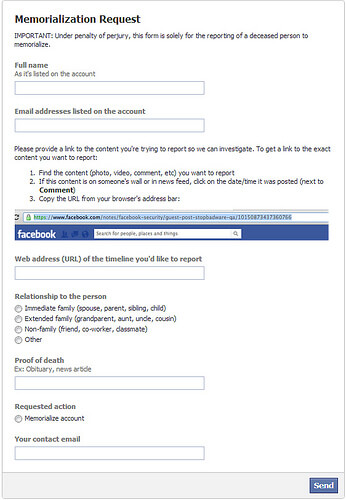Your Life on Facebook
With the introduction of the Timeline feature on Facebook, your entire life can literally flash before your very eyes and – and the eyes of others. It’s a lot of content that make for great memories once removed from this life. Personal indeed, is it safe for loved ones to access a significant other’s profile information, correspondences, messages, etc. after they’re gone? It turns out the cutting-edge 1986 Electronic Communications Act would prohibit you from doing so without a court order. Nearly thirty years later, the rapid growth of digital has lawmakers in a mad scramble to play catch up.
Most people often plan for financial arrangements, and estate distribution amongst family members, but what will transpire when you meet your digital demise? Facebook has replaced greeting cards, phone calls, and even gifts for birthdays, so it makes sense to share memories, photos and messages to remember those we’ve lost, right?
Friends and loved ones will leave wall posts, share photos, and send messages of sadness and loss to memorialize the deceased on Facebook, Twitter, and blogs. On the contrary, some may not like the ongoing posts to the walls of their family members. Here is where we enter the legal realm of a “digital assets” allocated under the Facebook licensing rules. Do you remember the Terms of Service you agreed to when signing up for your Facebook and Twitter accounts? Your digital assets are licensed to those websites and expire when you die.
Submit a Memorialization Request
In October of 2012, Facebook unveiled its updates to “Memorialize” Facebook pages in the Data Use Policy section of their homepage. Memorialized profile pages will be removed from public searches, suggestions boxes, and unavailable for future log-ins or status updates. Your wall will still be accessible only to already confirmed “friends” to pay respect and post condolences.
You can contact Facebook to submit verification of a death by submitting a Memorialization Request. You will need to include a link to the content you want to report (obituary, news article, certificate of death), some personal information, and the basic account information of the deceased.
Verified or immediate family members can also have the account deleted entirely if they feel that is the right decision. If prior consent is given, a downloadable version of the account’s data or if a court order is provided.
How to Prepare for your Digital Demise?
Create a digital estate plan just as you would include information and distribution of other physical or monetary assets in your will. Include a spreadsheet of usernames, passwords, email accounts, and letter of consent. Your consent will detail your wishes for account memorialization, termination, or a downloaded version of your profile data. Twitter and Facebook offer an archive version of your profiles, allowing you to download every tweet and post throughout the years.
There is also an app for that called ifidie where you can leave a message that will only be published on Facebook after you die. Simply install the app on Facebook, choose your message, and choose trustees that will be in charge of reporting your death, and there you have it – you can leave jokes, favorite quotes, and personalized messages for all to hear.
Hopefully this blog post will find you before the Father Time does. It’s important to consider your options and go over the details with those who are close to you. If you your account is inactive and there is no further action, your account is vulnerable to spam or Facebook will completely delete your account. To learn more visit the Facebook Help Center for FAQ’s and more on material on managing your profile.
About the Author:
Written by Chelsea Hennen. Chelsea is a writer at Happy Dog Web Productions.










2 Comments
I’m buying popsickles today in honor of Uncle Rich!
Happy Birthday Uncle Rich-You were the best Husband, Father, Brother, Grandfather, Uncle, Great grandpa & friend! Here’s a popsickle in memory of you!